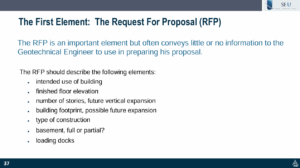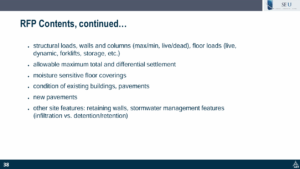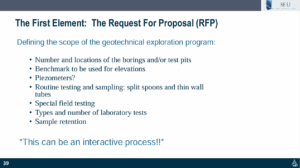Effective RFPs for Geotechnical Reports
When the Geotechnical engineer is first engaged to provide a geotechnical report, they are often working off of limited project information and may not have a clear vision of the proposed structure. Without detailed project information, the geotechnical report might not provide all of the information the structural engineer requires, and may lead to the structural engineer having to make generalized assumptions about the site specific soil conditions. How then can structural engineers-of-record ensure they get the information they need on projects when there is no national standard for what is included on geotechnical reports?
In the December 2024 SEU session, Andrew Walters, PE, from American Engineering Testing, presented Guide to Understanding a Project Geotechnical Report. Andy explained the importance of a project geotechnical report to various members of the project team, and described the field exploration methods and tests commonly used as part of a project geotechnical evaluation. Andy offered guidance on achieving the information needed in a project geotechnical report and the importance of understanding the report in its entirety.
Andy suggested that structural engineers become involved early on in the project with the RFP for geotechnical services. There are many important elements that would be useful for the geotech engineer to form the basis of an RFP. As shown in the slides below, the intended use and future building expansion plans, intended structural loads, and unique project elements should all be noted so the geotech can make appropriate recommendations.
After providing detailed project information, the RFP should also include the intended scope of the geotechnical services. This is especially helpful when comparing RFPs from different geotech firms. Having conversations early on and often with a geotechnical engineer can provide insight into which services would be needed based on the unique aspects of the project.
Structural engineers are not always included in these early discussions when owners and architects launch a new project. However, one of the first aspects the structural engineer-of-record should engage on the project team is a competent geotechnical engineer to ensure the necessary information is obtained for the site specific soil conditions. Communication early in the project can produce a useful and complete geotechnical report.





There are no comments yet, but you can be the first